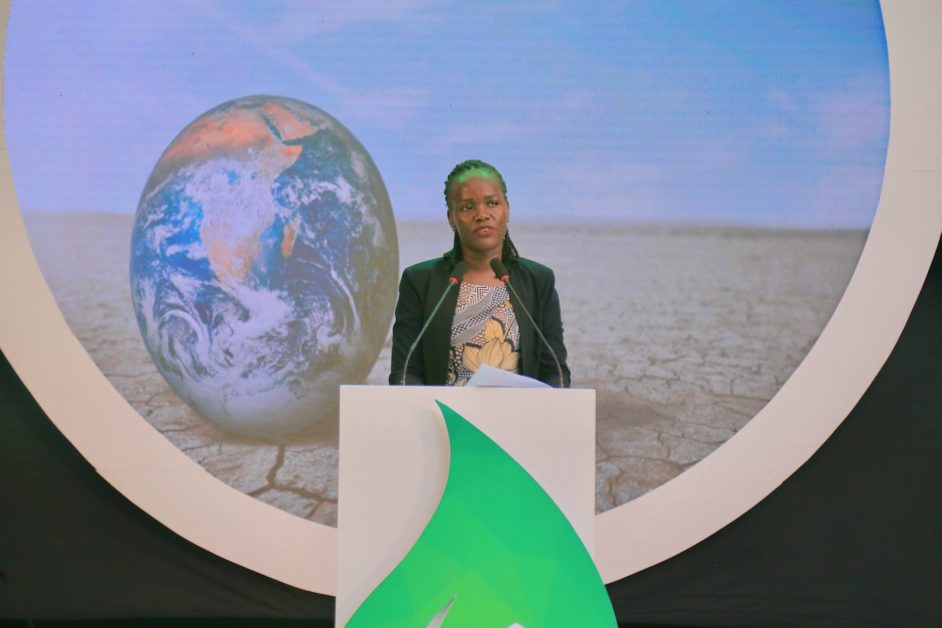Uganda Development Bank (UDB), the country’s key strategic partner in delivering socio-economic transformation through sustainable financial interventions, on April 4th launched the UDB Climate Finance Facility (CFF)⏤ a strategic Fund that will make available affordable finance that aims to promote climate-smart agriculture, ensure climate resilient infrastructure and low carbon industries.
Addressing guests at the launch, the Managing Director UDB Ms. Patricia Ojangole said “the increasing threat of climate change and environmental degradation has the potential to present high socio-economic risks to the economy”.
“As the impacts continue to manifest through floods, drought, landslides, animal and crop epidemics among other signs in different parts of the country, they are more deleterious to the poor and marginalised who depend largely on natural resources for their livelihoods,” she added.
Over 70% of Ugandans depend heavily on micro, small, and medium enterprises (MSMEs) for employment, and these generally have less capacity to withstand financial shocks.
“The vulnerability of Uganda’s population requires the urgent need to adapt and maintain future economic growth opportunities by transitioning to a low carbon (green) economy. This will require massive investment in green technologies. Green finance will be central to providing the flows of capital required. This is primarily driven by the fact that most green technologies are characterised by high capital intensity and consequently high upfront financing requirements,” she told stakeholders gathered for the facility’s launch at Mestil Hotel In Kampala.
As a financial intermediary, the Bank will stimulate green economic growth by coordinating green financing options, mobilising and increasing access to green finance by structuring and providing tailored products to address market gaps including risk mitigation products, and providing the right products to address investment demand in the green sector.

Mr. Ramadhan Ggoobi, Permanent Secretary/Secretary to the Treasury applauded UDB for the intervention, saying that “without appropriate funding, we cannot build the capacity to adapt to these impacts, to mitigate these impacts, or even build resilience”.
“Am delighted that financial institutions are starting to realise their role in the climate change agenda and strategically getting involved,” he said.
The initiative will foster climate-conscious change in investments with a clear objective of building climate resilience among the businesses supported. The intention is to build climate-proof businesses as this is a better strategy for building long-term viable enterprises that are adaptive to climate impacts and seek a low-carbon development pathway.
The move to create a Climate Finance Facility builds on the Bank’s successful initiatives to foster innovation, engender holistic sustainability, and increase interest in green technologies. In line with the Bank’s priority sectors, the facility shall target investments in Climate Smart Agriculture, Low Carbon Industries, Climate Resilient Infrastructure, and cross-cutting projects like sustainable waste management, clean energy – renewable energy and energy efficient projects, sustainable water resources management, eco-tourism, and related investments.
“There have been commendable efforts by the Government in establishing structures and policies to advance climate action. Progress is ongoing in scaling up local community solutions to manage climate impacts. However, it is now time for financial institutions and private sector players to get involved. That’s why we are committing UGX 50 billion towards the capitalization of this facility. This is expected to grow with support from various partners over time,” Ms. Ojangole concluded.
The beneficiaries will also be exposed to the Bank’s Green Investment Advisory as well as the Project Preparation Support to make them bankable but more importantly, grow them to become viable green businesses.
Eligible sectors and initiatives include climate-smart agriculture and agribusiness, low-carbon industry, climate-resilient infrastructure, eco-tourism, clean energy and sustainable waste management. Applicants for financing will have to demonstrate how they reduce current and/or future vulnerabilities to climate change impacts, and the efforts to reduce or limit greenhouse gas (GHG) emissions or enhance GHG sequestration both in the short and long run. Investments shall demonstrate compliance to environmental sustainability and climate action. In addition to demonstrating green impact, they will also have to meet standard borrowing requirements of the bank.
The facility is embellished with other benefits such as Green Investment Advisory services, to be provided by the bank to enable and facilitate green enterprises start and/or scale up their businesses through innovation labs/hubs. Prospective clients will get customized training in leadership and governance, financial literacy, business development and climate risk assessment, among other pertinent skills. The bank will also over project Preparation and financial structuring support, including support with innovative ideas to conceptualise designs, undertake pre-feasibility and feasibility studies, and financial structuring that guides commercial operations.
The UDB Climate Finance Facility (CFF) is a special-purpose vehicle with a unique and specific focus on finance to unlock and catalyse private sector investment in enterprises that drive green impact and financial inclusion. Eligible sectors include climate-smart agriculture and agribusiness, low-carbon industry, climate-resilient infrastructure, eco-tourism, clean energy and sustainable waste management.
 STEADFAST AND RESILIENT: Equity Bank Uganda consolidates position among top 5 banks, despite a one-time provisioning-related loss in 2023
STEADFAST AND RESILIENT: Equity Bank Uganda consolidates position among top 5 banks, despite a one-time provisioning-related loss in 2023